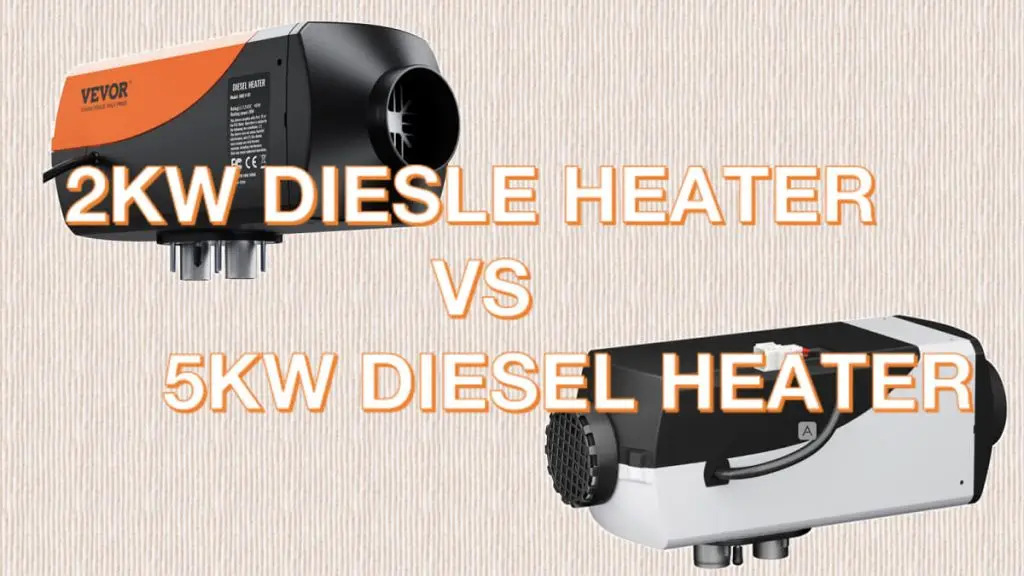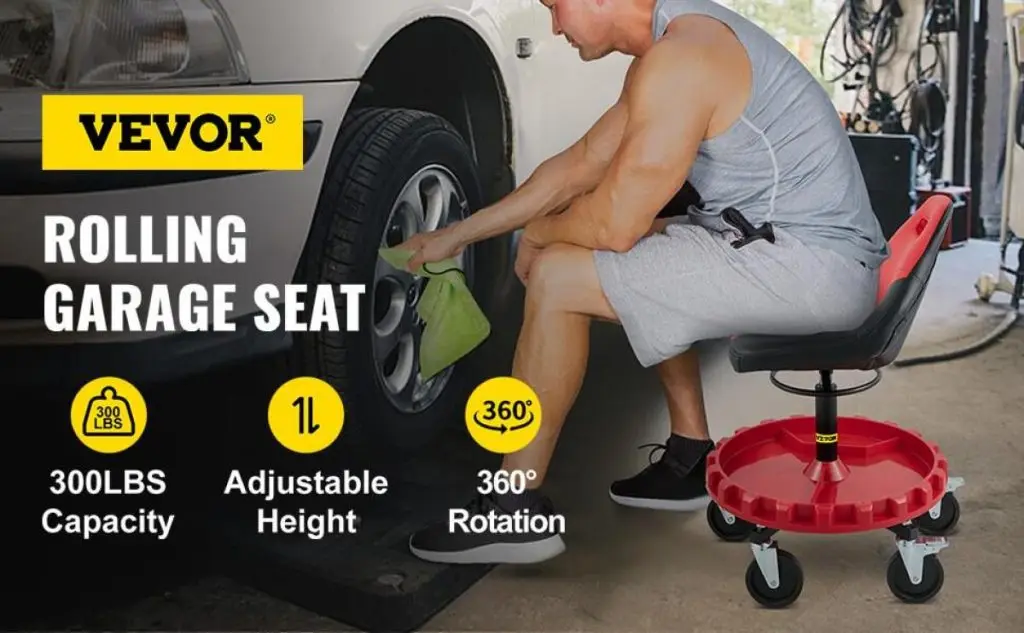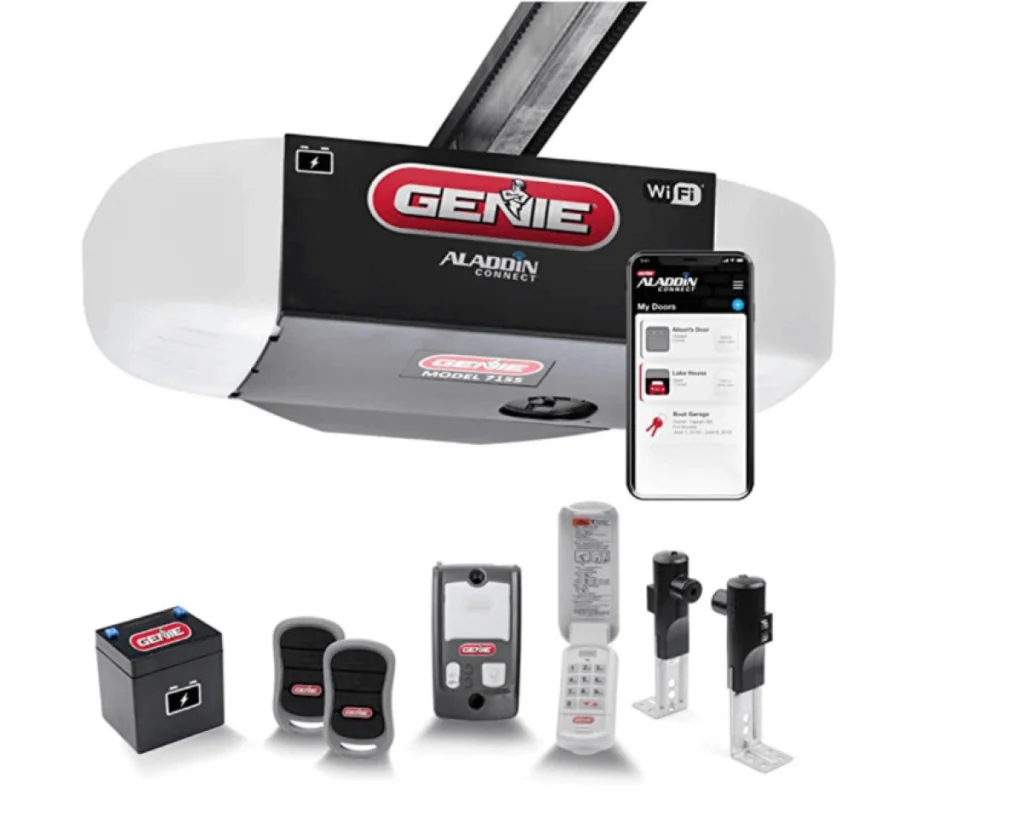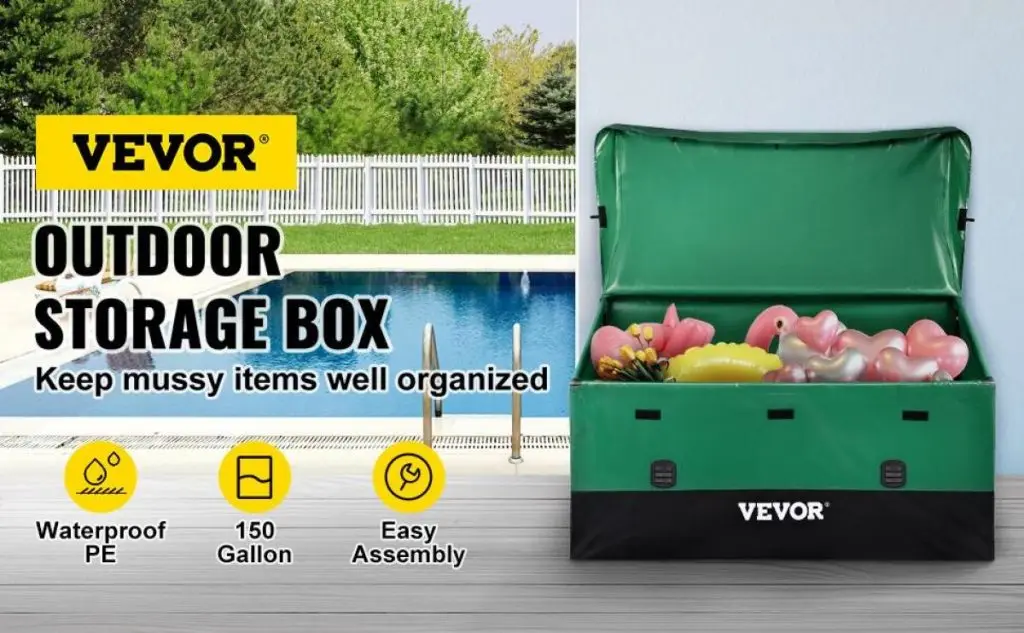Speaking about cold seasons one has to understand that to be warm is not only a luxury but it is a necessity. Regardless of whether it is a camping area outside, motorhome living, or working in a workshop, the right heating may just be the difference. Heaters that run on Diesel have been found to be some of the most efficient, reliable, and adaptable heaters ever. However, selecting the appropriate equipment might be a difficult task.
This blog therefore emphasizes the major differences between 2KW and 5kW diesel heaters, allowing you to choose the most appropriate equipment as per your heating needs.
Table of contents
Why Diesel Heater Size Matters

Whether you’re warming up a compact workshop, a spacious warehouse, or a cozy living area, selecting the correct heater size can have a huge difference and here’s why:
Understanding Heating Capacity
Heat output is normally rated in kilowatts (kW) for a diesel heater and one of the critical specifications for any heater depends on the available space among others.
The appropriate heater size depends on several key factors:
- Room volume (cubic meters)
- Insulation quality
- Outside temperature
- Desired indoor temperature
- Building construction materials
- Number of windows and doors
Kilowatt Rating Breakdown:
- 1-2 kW: Small spaces (up to 20 sq. meters)
- 2-5 kW: Medium rooms (20-50 sq. meters)
- 5-10 kW: Large areas (50-100 sq. meters)
- 10-20 kW: Industrial or large open spaces
Kilowatt ratings directly influence:
- Fuel consumption
- Heat distribution
- Energy efficiency
- Operating costs
The Consequences of Underheating or Overheating
When a diesel heater is too small for the space it can lead to:
- Insufficient warmth
- Constant running of the heater
- Increased fuel consumption
- Uneven temperature distribution
- Potential cold spots
- Reduced comfort
- Higher long-term energy costs
Performance Indicators of Underheating can include elements like:
- Room temperature remains below desired level
- Heater runs continuously
- Noticeable temperature differences across the space
- Increased strain on heating equipment
When a diesel heater is too large for the space it leads to:
- Rapid, intense heating
- Frequent cycling on and off
- Unnecessary fuel consumption
- Potential thermal stress on materials
- Uneven heat distribution
- Increased wear on heating components
Performance Indicators of Overheating include:
- Quick temperature spikes
- Frequent heater shutdowns
- Higher fuel bills
- Potential condensation issues
- Uncomfortable temperature fluctuations
Hence, to overcome these issues here are a few strategies that you can implement:
- Measure your space accurately
- Consider insulation quality
- Factor in external temperature variations
- Consult professional sizing charts
- Consider additional heat sources
- Account for future space changes
In-Depth Look at 2kW Diesel Heaters
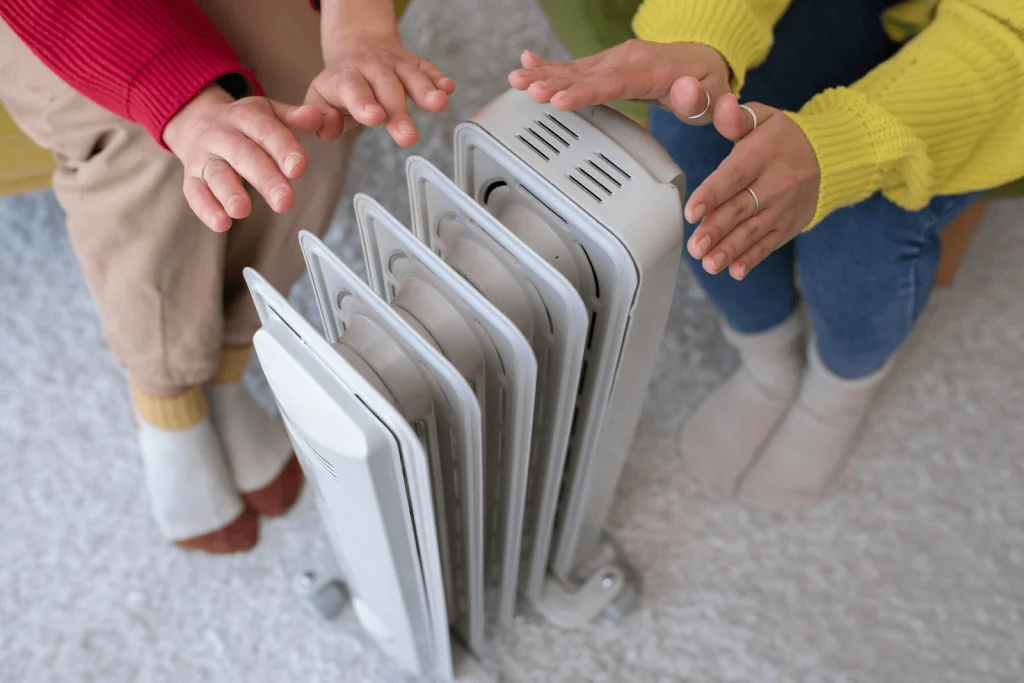
Diesel heaters have emerged as versatile heating solutions across various settings, offering reliable warmth and efficient performance. These compact yet powerful devices leverage diesel fuel to generate heat, making them increasingly popular in mobile and stationary applications. Let’s explore two prominent configurations: 2kW and 5kW diesel heaters, each designed to meet distinct heating requirements:
2kW Diesel Heaters: Compact Efficiency for Smaller Spaces
A 2kW diesel heater represents an excellent heating solution for compact environments.
Recommended For Your Project
Ideal Applications
These units are particularly well-suited for small campers, recreational vans, compact workshops, and other limited-space areas where efficient, targeted heating is required. Their modest size and low power consumption make them an ideal choice for individuals seeking practical warming solutions in confined spaces.
Key Benefits
2kW diesel heaters offer several compelling advantages.
- Among their main advantages is outstanding fuel efficiency, which leads to lower costs of the operations.
- The small footprint design allows for easy transportability so that users can move and fix the heater with minimum effort involved.
- Additionally, these units provide consistent heat output while maintaining a relatively low environmental footprint.
Limitations of 2kW Models
Despite their advantages, 2kW diesel heaters do present certain constraints. The most significant limitation is their restricted heating capacity, which may prove inadequate for larger areas or spaces with high thermal demands. You should carefully evaluate your specific heating requirements to ensure the 2kW model matches your needs.
Exploring 5kW Diesel Heaters
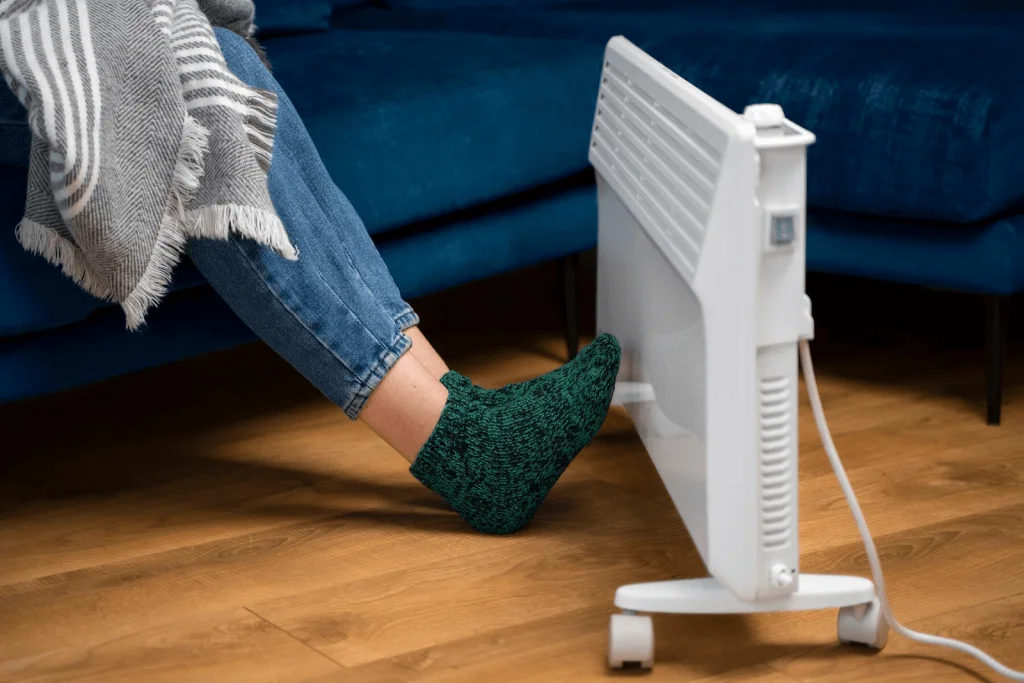
5kW diesel heaters are engineered to address heating challenges in more expansive environments.
5kW Diesel Heaters: Powerful Heating for Larger Areas
These robust units are exceptionally well-designed for large recreational vehicles, maritime vessels, spacious workshops, garages, and other substantial indoor spaces that demand more intensive heating capabilities.
Recommended For Your Project
Benefits and Drawbacks of 5kW Models
The primary advantage of 5kW diesel heaters lies in their substantial heating output. These units can quickly and efficiently warm larger areas, providing comprehensive temperature control in challenging environments. The increased power allows for more rapid and uniform heat distribution compared to smaller models.
However, the enhanced heating performance of 5kW models comes with specific trade-offs. The most notable consideration is increased fuel consumption, which directly correlates with higher power output. Focus on higher operational costs and a greater environmental impact compared to lower-wattage alternatives.
Head-to-Head Comparison: 2kW vs 5kW Diesel Heaters
Let’s take a look at the difference between 2kW and 5kW diesel heaters:
Heating Capacity and Room Size
Room size and heating capacity represent critical factors that determine a diesel heater’s effectiveness. This section explores the performance of 2kW and 5kW diesel heaters, to see how different models accommodate varying spatial requirements and environmental conditions:
| Characteristic | 2kW Diesel Heater | 5kW Diesel Heater |
| Recommended Room Size | 100-215 sq ft | 215-430 sq ft |
| Typical Heating Range | Small spaces, compact areas | Large spaces, open areas |
Ideal Environments | Camper vans, Small workshops, Tiny homes, & Compact trailers | Large RVs, Boot cabins, Workshops, Garages, & Construction sites |
| Heating Effectiveness | Precise, targeted heating | Comprehensive, rapid warming |
| Heat Distribution | Localized, concentrated | Wide-area, uniform coverage |
Fuel Efficiency and Consumption
Fuel efficiency represents a critical evaluation parameter for diesel heaters, directly impacting operational costs and environmental sustainability. Let’s look at an in-depth exploration of fuel consumption patterns across 2kW and 5kW models:
| Metric | 2kW Diesel Heater | 5kW Diesel Heater |
| Average Fuel Consumption | 0.1-0.2 L/hour | 0.3-0.5 L/hour |
| Fuel Efficiency Rating | High | Moderate |
| Daily Operational Cost | $1-$3 | $3-$6 |
| Annual Fuel Expenditure | $150-$450 | $450-$900 |
| Fuel Tank Capacity | 2-5 liters | 5-10 liters |
Noise Levels and Energy Usage
Operational noise and energy consumption represent crucial factors in selecting an appropriate diesel heater. Let’s discuss the acoustic and electrical characteristics of 2kW and 5kW models:
| Aspect | 2kW Diesel Heater | 5kW Diesel Heater |
| Noise Level | 35-45 dB (Quiet) | 45-55 dB (Moderate) |
| Comparable Noise | Quiet library | Normal conversation |
| Electrical Power Draw | 10-20 watts | 20-40 watts |
| Energy Efficiency Rating | Excellent | Good |
| Suitable for Night Use | Highly recommended | Acceptable with sound considerations |
Cost Differences and Value for Money
Understanding the financial implications of diesel heater selection involves evaluating initial purchase costs, maintenance expenses, and long-term value propositions. Let’s evaluate initial costs and long-term value of each heater:
| Cost Consideration | 2kW Diesel Heater | 5kW Diesel Heater |
| Initial Purchase Price | $200-$500 | $500-$1,000 |
| Installation Cost | $50-$150 | $150-$300 |
| Maintenance Expenses | Low | Moderate |
| Estimated Lifespan | 5-7 years | 7-10 years |
| Cost-Effectiveness Rating | High | Moderate to High |
How to Choose the Right Diesel Heater for Your Needs
Let’s walk you through the key considerations to ensure you make the best choice:
Assessing Your Space and Insulation
1. Precise Area Measurement
- Measure the total square footage of the space you need to heat
- Calculate ceiling height, as this impacts heating requirements
- Consider open vs. enclosed spaces
- Use a laser measure for accuracy
2. Insulation Quality Evaluation
- Inspect wall, ceiling, and floor insulation
- Check for:
- Proper insulation material
- Thickness of insulation layers
- The presence of air gaps or drafts
- Window and door seal quality
3. Heat Loss Calculation
- Perform a comprehensive heat loss assessment
- Factors to consider:
- Exterior wall material
- Number and size of windows
- Door types and seals
- Roof and floor construction
- Use professional heat loss calculation tools or consult an expert
Climate Conditions and Usage Frequency
1. Temperature Range Analysis
- Determine your local climate’s minimum and maximum temperatures
- Consider seasonal temperature variations
- Assess temperature difference between indoor and outdoor environments
2. Usage Patterns
- Continuous vs. intermittent heating needs
- Peak heating hours
- Duration of daily or weekly usage
- Specific temperature requirements
3. Climate-Specific Considerations
- Cold regions: High-output heaters with robust performance
- Moderate climates: Flexible, moderate-capacity heaters
- Humid areas: Heaters with moisture resistance
- Extreme environments: Industrial-grade diesel heaters
Budget and Long-Term Operating Costs
1. Initial Investment
- Upfront heater purchase price
- Installation costs
- Potential modifications to space
- Accessories and additional equipment
2. Fuel Efficiency Evaluation
- BTU output per gallon of diesel
- Fuel consumption rates
- Efficiency ratings
- Comparison of different models
3. Ongoing Operational Expenses
- Diesel fuel prices in your area
- Maintenance costs
- Replacement part availability
- Projected annual operating expenses
4. Cost-Effectiveness Calculation
- Create a 5-year total cost of ownership spreadsheet
- Compare different heater models
- Consider energy efficiency ratings
- Factor in potential energy savings
The VEVOR Advantage: Quality Diesel Heaters for Every Need

VEVOR has established itself as a leader in portable heating solutions, offering versatile diesel air heaters that cater to a wide range of applications. Whether you’re looking to warm up your RV, workshop, vehicle, or indoor space, VEVOR provides reliable and efficient heating solutions that stand out in the market.
Why VEVOR’s 2kW and 5kW Diesel Heaters Stand Out
Innovative Features:
- Intelligent Heating Technology
- Sandblasting aluminum heat exchanger for rapid heat production
- Ability to heat spaces within 10 minutes
- Coverage ranges from 108-215 square feet (depending on model)
- Temperature adjustable from 46°F to 96.8°F
- Advanced Control Systems
- 32 ft long-distance remote control
- Large LCD display for easy monitoring
- Precise temperature and timing controls
- Pre-heating capabilities for vehicles and indoor spaces
- Exceptional Energy Efficiency
- Low fuel consumption (0.12-0.52 L/H)
- 10L/2.6-gallon fuel tank
- Continuous heating up to 38 hours (2kW model)
- Continuous heating up to 19 hours (5kW model)
- Versatile Performance
- Operates in extreme temperatures (-40°F to 104°F)
- Suitable for altitudes up to 9,843 feet
- Compatible with 12V & 24V power systems
- Adaptable for cars, RVs, trucks, boats, and indoor spaces
- Safety Features
- Overheating protection at ≥518°F
- Constant temperature control
- Timing function
- Voice broadcasting
- High safety system for worry-free usage
Customer Satisfaction and Testimonials
Real users consistently praise VEVOR’s diesel heaters:
Wayne Roberts: “Excellent diesel heater much better than expected. Easy to set up and use. It’s really good on fuel and heats my garage up quickly.”
Christopher Bailey: “Using this to heat my 20 by 30 foot shop. Was concerned about heat output but am amazed at the BTUs. For the money, there is nothing else as good.”
Stovepipe: “Very happy with the heater. Price, quality, fast shipping. I’m using the heater in a 40x40x16 shop and at -20°C it keeps the temperature at 10°C.”
Bradley: “Overall, I am very happy with this unit. It’s quiet, doesn’t burn much fuel. Each unit heats about 550 sq feet really well.”
Warranty and Support Services
While specific warranty details aren’t outlined in the documents, VEVOR demonstrates commitment to customer satisfaction through:
- Responsive customer support
- Detailed product specifications
- Comprehensive user manuals
- Quick resolution of customer queries
- Multiple purchase options (PRO pricing, app discounts)
- Free delivery to the United States
With overwhelmingly positive reviews (4.8/5 stars across both models) and a wide range of features, VEVOR diesel heaters represent an exceptional value proposition for those seeking reliable, efficient, and versatile heating solutions.
Potential buyers are encouraged to carefully review installation requirements and ensure proper ventilation and power supply to maximize the performance and safety of these diesel air heaters.
Installation and Maintenance Tips
Diesel heaters are critical components in many industrial, automotive, and residential settings, providing reliable warmth in challenging environments. Proper installation and consistent maintenance are key to ensuring optimal performance, safety, and longevity of these heating systems. Let’s walk you through essential considerations for installing and maintaining your diesel heater.
Proper Installation Practices
Choosing between professional installation and a do-it-yourself approach is a crucial first step in setting up a diesel heater:
- Professional Installation Advantages:
- Ensures compliance with local safety codes and regulations
- Guarantees correct fuel line and electrical connections
- Provides professional assessment of optimal placement
- Includes comprehensive system testing
- Preserves manufacturer’s warranty
- DIY Installation Considerations:
- Suitable for individuals with advanced mechanical skills
- Requires in-depth knowledge of:
- Fuel system connections
- Electrical wiring
- Ventilation requirements
- Local building codes
- Potential risks of improper installation include:
- Fuel leaks
- Carbon monoxide exposure
- Inefficient heating
- Potential equipment damage
- Critical Installation Checklist:
- Proper ventilation and exhaust routing
- Secure mounting on stable, level surface
- Adequate clearance from combustible materials
- Correct fuel line connections
- Appropriate electrical connections
- Proper grounding
- Installation of safety shut-off mechanisms
Regular Maintenance for Longevity
Consistent maintenance is essential for preserving your diesel heater’s efficiency, safety, and performance:
- Routine Inspection Schedule:
- Monthly visual inspections
- Quarterly comprehensive system checks
- Annual professional servicing
- Key Maintenance Tasks:
- Fuel System:
- Regularly check fuel lines for cracks or leaks
- Replace fuel filters according to manufacturer’s recommendations
- Drain water and sediment from fuel tanks
- Use fuel stabilizers in long-term storage situations
- Combustion Chamber:
- Clean and inspect burner nozzles
- Remove carbon buildup
- Check flame quality and combustion efficiency
- Inspect and replace worn ignition components
- Electrical Components:
- Test and clean electrical connections
- Verify proper voltage and amperage
- Inspect wiring for wear or damage
- Lubricate moving parts as recommended
- Fuel System:
- Safety Maintenance Protocols:
- Install carbon monoxide detectors near heater
- Ensure proper ventilation
- Keep surrounding area clean and free from combustible materials
- Maintain fire extinguisher nearby
- Check and replace smoke and CO detectors annually
- Performance Optimization:
- Monitor fuel consumption
- Track heating efficiency
- Listen for unusual noises
- Check for consistent heat distribution
- Calibrate thermostat and control systems
- Seasonal Preparation:
- Comprehensive cleaning before the winter season
- A thorough inspection of all components
- Test run to ensure smooth operation
- Prepare backup heating alternatives
Conclusion
In comparing 2kW and 5kW diesel heaters, several crucial distinctions emerge that can significantly impact your heating experience. The 2kW diesel heater is ideal for smaller spaces like compact workshops, RVs, or small garages, providing efficient heating for areas up to approximately 150-200 square feet. The 5kW model offers substantially more powerful thermal output suitable for larger environments such as warehouses, construction sites, or expansive workshops exceeding 300-400 square feet.
When selecting between these two options, carefully assess your specific heating needs, considering factors such as space dimensions, insulation quality, ambient temperature, and intended usage. Matching the heater’s capacity to your precise requirements ensures optimal comfort, energy efficiency, and cost-effectiveness.
For those seeking reliable and high-performance diesel heaters, VEVOR presents an excellent range of options. Their diesel heaters are renowned for robust construction, consistent performance, and advanced safety features. Whether you choose the 2kW or 5kW model, VEVOR provides dependable heating solutions backed by quality engineering and customer satisfaction.

